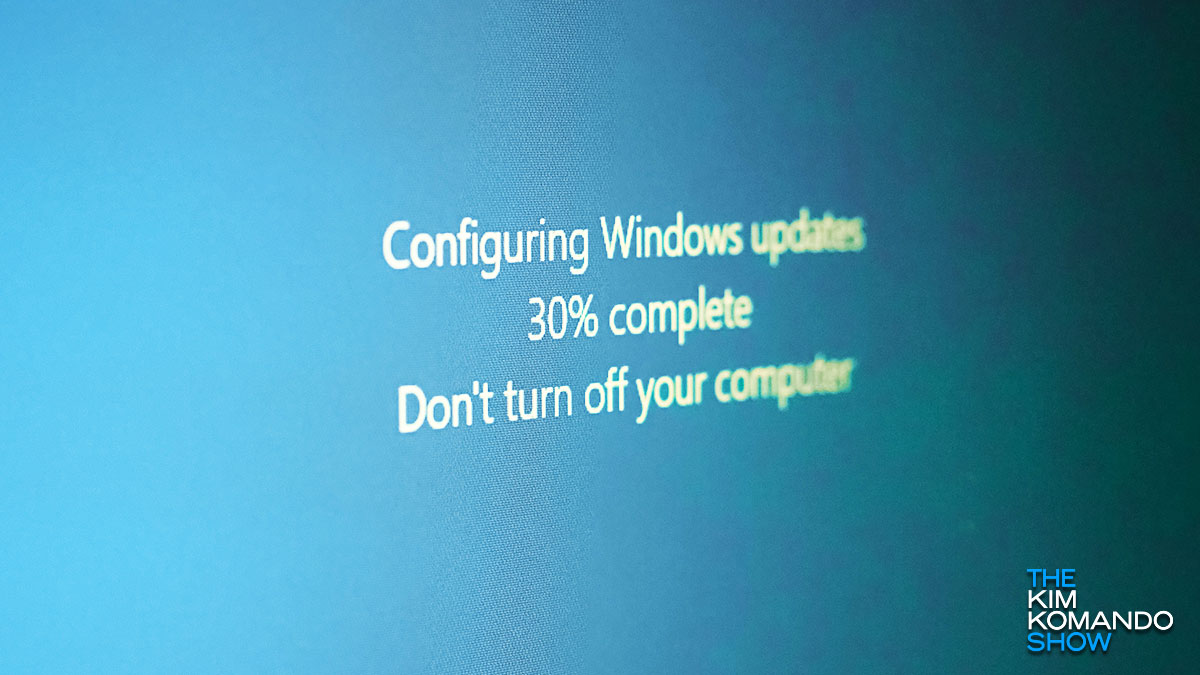Update Windows 10: Bug lets hackers steal your files

A new security flaw has been found in Windows 10 that lets hackers delete files, change data and install programs without you knowing. It’s a dangerous bug, but thankfully, Microsoft’s May Patch Tuesday update is here to save the day.
As important as this patch is, we’re genuinely curious as to how stable the release will be. That may sound a bit cynical, but can you really blame us? It’s not like the last few updates were exactly the smoothest affairs. Tap or click here to see how the last Windows update deleted users’ files.
If you’re hesitant to download the new Windows update, don’t be. As of now, this patch is the best way to protect your system from this new cybersecurity threat. Here’s what you need to know about the May 2020 Patch Tuesday update.
Dangerous flaw in Windows 10: Update immediately
A pair of dangerous security holes have been found in the Microsoft Color Management and Windows Media Foundation portions of Windows 10. Using a specially crafted malicious website, hackers can exploit this flaw to break into your computer and gain administrative access.
Once inside, they can easily delete your files, make changes to settings and install new software without you ever knowing they’re doing it.
The only catch to this exploit: You have to be tricked into downloading a malicious file or visiting a compromised website in order to be affected. Unfortunately, that’s become easier than ever with how prominent and aggressive phishing attacks have become in recent weeks. Tap or click here to see why there are so many phishing scams.
Windows update is here and it’s chock full of bug fixes
Just in time to save the day, Microsoft has announced its latest patch for Windows 10: Version KB4556826. This release, part of the monthly Patch Tuesday series of updates, is the third-largest in Windows history — with fixes for 111 security bugs across 12 different products. Tap or click here to see how big the last major update was.
This beats out the previous Patch Tuesday updates from the past two months, which both fixed a similarly high number of bugs upon release. Why Microsoft has needed to patch such a comically large amount of bugs is unknown, but at least it appears to be aware of the issue.
This update, however, is not to be confused with the May 2020 update that Windows beta testers are writing rave reviews about. Tap or click here to see what that update will contain when it drops in late May.
In addition to the exploits mentioned above, bugs fixed by the May Patch Tuesday update include several remote code execution flaws, as well as a security hole in Microsoft Edge’s PDF reading capabilities. All of these bugs can lead to hostile cyberattacks, which makes downloading the update extremely important.
How bad can it get? COVID-19 scams skyrocket another 30%

If you’ve been hit with a scam attempt (or a lot of them) in the past few months, you’re not alone. Studies have shown that cybercrime and fraud have spiked significantly during the COVID-19 pandemic, with phishing attacks seeing a whopping 30% increase in the past three weeks alone.
Security alert: Millions of computers vulnerable to devastating new hack

What if there were a way to hack into your computer and steal files without leaving a trace? Most viruses nowadays can be detected by antimalware programs, and phishing attacks are obvious once you realize you’ve been duped. To pull off a totally foolproof hack, you need to crack the system’s hardware, not software.
Coronavirus: Listen to these scam calls so you don't fall for them

The consequences of the COVID-19 pandemic are far-reaching, and not even the internet is safe! Besides being the world’s number one topic for discussion and arguments, coronavirus has fueled an unfortunate spike in cybercrimes and scams.
If you get this gift card in the mail, beware - it's a trap

Americans are feeling the impacts of the coronavirus in many ways and it’s hit the economy and our bank accounts extremely hard. Businesses are closing, employees are getting laid off across the U.S. and there have been nearly 10 million new unemployment claims in the past two weeks.
Cyberattacks are increasing, do these 5 steps now

You’re stuck at home. You’re worried about your family, your job, the economy, your savings, your bills, your supplies and, of course, yourself. Sadly, there’s a new issue to add to your list.
No one is really talking about another frightening virus outcome except in the most inner security circles. Here it is: Cybercriminals are gearing up. So far we’ve seen a surge in phishing attacks, malicious websites and phone scams.
Bing's live coronavirus map tracks cases, deaths and recoveries - try it

We’re definitely living in strange times. The coronavirus pandemic has most everyone in a panic, leading to empty grocery store shelves and a shortage on toilet paper. Not only that, but some stores are even running out of bags to pack and carry out the products and groceries you actually do find to buy.
New Batman-like tech kills coronavirus on the spot

COVID-19, better known as the coronavirus, has been spreading fear across the globe faster than the virus is spreading itself. There has been such a panic that stores aren’t able to keep hand sanitizer on their shelves and bottles are being sold by third parties online for up to $100. Crazy, right?
Microsoft Defender is coming to Android and iOS to fight malware on your phone

Cybercriminals have been finding ways to rip people off since the early days of the internet. Phishing attacks, ransomware, spoofed websites that infect your device with malware — it’s all out there.
We’ve even seen a new version of an old-school virus making the rounds recently. Tap or click here to find out how to stop it.
Check Google Chrome! 500+ extensions spreading dangerous malware

It’s no exaggeration to say Google has a malware problem. And we’re not talking about the malware users run into when exploring the web. We’re talking about overlooked malware that floats around on platforms Google actually owns.
Beware of hackers planting Valentine's Day malware

How is everyone liking the new normal? No, we’re not talking about the data economy, the pandemic or the foreign disinformation operations. We’re talking, of course, about how hackers are everywhere — and how they’re not giving up until they’ve captured all of your data.
Avoid 'free' downloads of these Oscar favorites - they're hiding malware

If you’re a movie fan, this is a huge weekend. The 92nd Academy Awards ceremony airs Sunday, Feb. 9, and tons of great films will win Oscars.
Just the mention of Oscar-nominated movies gives many of us the itch to binge-watch them all. You might be able to catch some of them on Netflix or Amazon Prime Video. Tap or click here to find out which service is better for movies.
Scams and phishing attacks spreading amid Iran cyberwar fears - don't get fooled

A little over a week into the new year and almost like clockwork, cybercriminals are already busy making the rounds with their latest scams. If it isn’t an attempt at stealing your identity, it’s a scam to pilfer your passwords.
Don't fall for this 'White House' phishing email

There’s a brand new phishing email that’s making the rounds. I’ve seen it personally, and it’s using a well-known political figure to trick you into clicking. You’ll recognize this name when it pops up in your inbox, but the message isn’t really from her – it’s from scammers! Take a look at this screenshot, and I’ll point out the major discrepancies.
